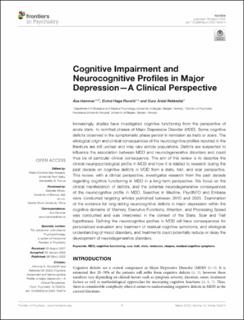| dc.contributor.author | Hammar, Åsa Karin | |
| dc.contributor.author | Ronold, Eivind Haga | |
| dc.contributor.author | Rekkedal, Guro Årdal | |
| dc.date.accessioned | 2023-02-27T12:35:16Z | |
| dc.date.available | 2023-02-27T12:35:16Z | |
| dc.date.created | 2022-05-15T17:50:48Z | |
| dc.date.issued | 2022 | |
| dc.identifier.issn | 1664-0640 | |
| dc.identifier.uri | https://hdl.handle.net/11250/3054254 | |
| dc.description.abstract | Increasingly, studies have investigated cognitive functioning from the perspective of acute state- to remitted phases of Major Depressive Disorder (MDD). Some cognitive deficits observed in the symptomatic phase persist in remission as traits or scars. The etiological origin and clinical consequences of the neurocognitive profiles reported in the literature are still unclear and may vary across populations. Deficits are suspected to influence the association between MDD and neurodegenerative disorders and could thus be of particular clinical consequence. The aim of this review is to describe the clinical neuropsychological profile in MDD and how it is related to research during the past decade on cognitive deficits in MDD from a state, trait, and scar perspective. This review, with a clinical perspective, investigates research from the past decade regarding cognitive functioning in MDD in a long-term perspective. We focus on the clinical manifestation of deficits, and the potential neurodegenerative consequences of the neurocognitive profile in MDD. Searches in Medline, PsycINFO and Embase were conducted targeting articles published between 2010 and 2020. Examination of the evidence for long-lasting neurocognitive deficits in major depression within the cognitive domains of Memory, Executive Functions, Attention, and Processing Speed was conducted and was interpreted in the context of the State, Scar and Trait hypotheses. Defining the neurocognitive profiles in MDD will have consequences for personalized evaluation and treatment of residual cognitive symptoms, and etiological understanding of mood disorders, and treatments could potentially reduce or delay the development of neurodegenerative disorders. | en_US |
| dc.language.iso | eng | en_US |
| dc.publisher | Frontiers | en_US |
| dc.rights | Navngivelse 4.0 Internasjonal | * |
| dc.rights.uri | http://creativecommons.org/licenses/by/4.0/deed.no | * |
| dc.title | Cognitive Impairment and Neurocognitive Profiles in Major Depression—A Clinical Perspective | en_US |
| dc.type | Journal article | en_US |
| dc.type | Peer reviewed | en_US |
| dc.description.version | publishedVersion | en_US |
| dc.rights.holder | Copyright 2022 The Author(s) | en_US |
| dc.source.articlenumber | 764374 | en_US |
| cristin.ispublished | true | |
| cristin.fulltext | original | |
| cristin.qualitycode | 1 | |
| dc.identifier.doi | 10.3389/fpsyt.2022.764374 | |
| dc.identifier.cristin | 2024707 | |
| dc.source.journal | Frontiers in Psychiatry | en_US |
| dc.identifier.citation | Frontiers in Psychiatry. 2022, 13, 764374. | en_US |
| dc.source.volume | 13 | en_US |

